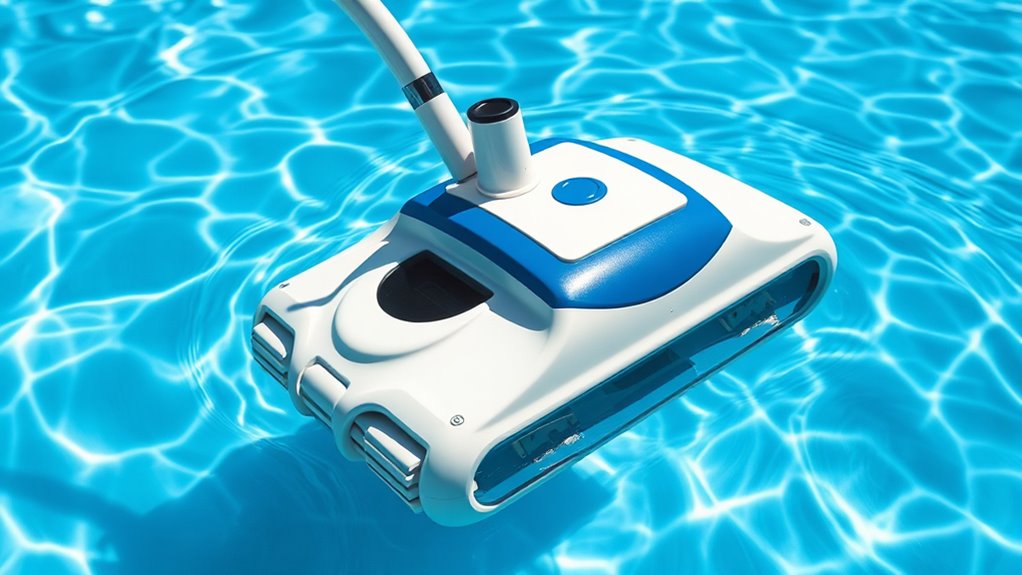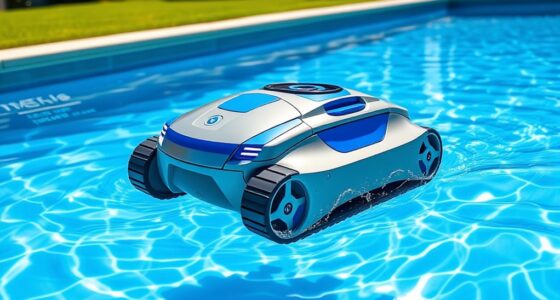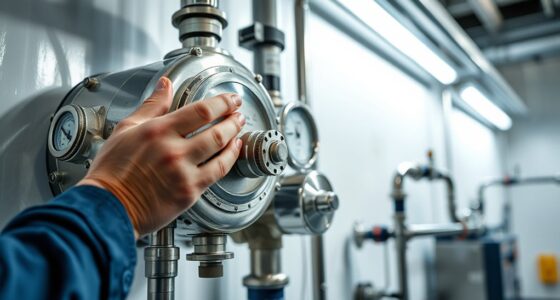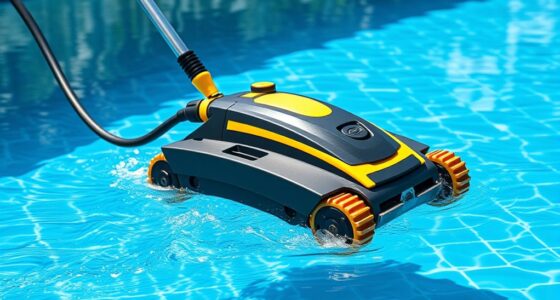If your automatic pool cleaner isn’t cleaning effectively despite routine maintenance, it’s probably time to replace it. Usually, after 3 to 5 years, parts like motors and brushes wear out, causing poor performance. Constant repairs and declining efficiency can add up, making a new model more cost-effective in the long run. If you want to discover the signs that signal a need for replacement and how to choose a better cleaner, keep exploring.
Key Takeaways
- The cleaner struggles despite regular maintenance and debris removal, indicating declining performance.
- The device is older than 3-5 years, increasing likelihood of motor failure or worn brushes.
- Repair costs are frequent and becoming more expensive, making replacement more cost-effective.
- Upgrading to a newer model offers better energy efficiency, advanced features, and improved cleaning.
- When performance declines and repairs pile up, replacing your pool cleaner is the most practical choice.
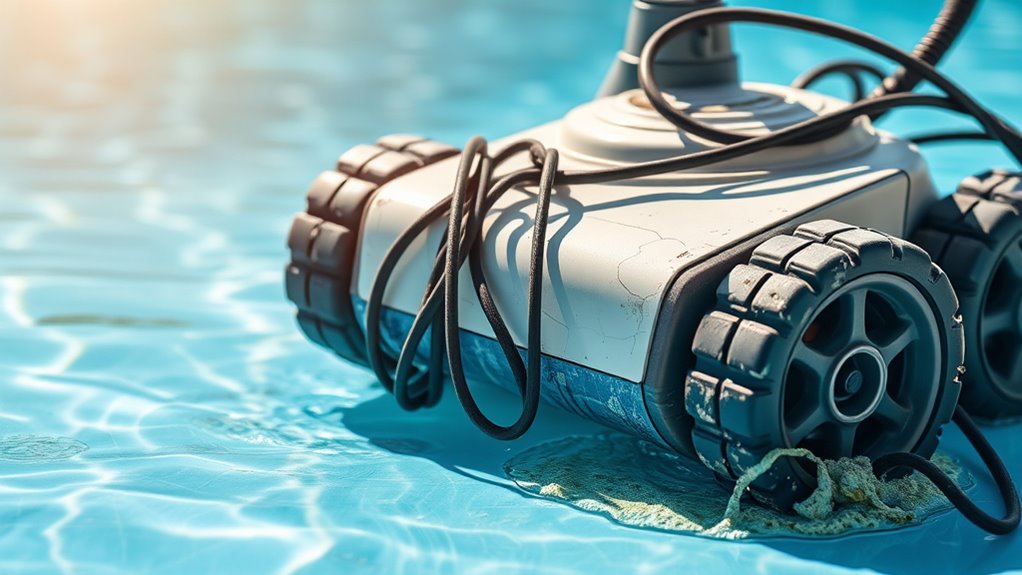
Are you noticing your automatic pool cleaner isn’t cleaning as effectively as it used to? If so, it might be time to contemplate whether a replacement is necessary. Before jumping to conclusions, it’s helpful to evaluate the cleaner’s performance and determine if simple maintenance tips could restore its efficiency. Sometimes, cleaning the brushes, checking the hoses, or clearing out debris can improve performance without the need for a new unit. However, if you’ve already tried these steps and your cleaner still struggles, you should assess whether the cost of repairs outweighs the benefits of replacing it altogether.
If your pool cleaner underperforms, try simple maintenance before considering replacement.
When deciding if it’s time to replace your automatic pool cleaner, consider the age of the device. Most cleaners have a lifespan of around 3 to 5 years, depending on usage and maintenance. As your cleaner gets older, it’s more likely to develop issues like motor failure, worn-out brushes, or clogged filters that become costly to repair. In these cases, replacing the cleaner may be more cost-effective in the long run. It’s important to weigh the maintenance tips you’ve already implemented against potential expenses. If frequent repairs are adding up or parts are no longer available, investing in a new cleaner might save you money and time.
Cost considerations play a significant role in this decision. While a new automatic pool cleaner might seem like a sizable upfront expense, it can offer better energy efficiency, improved cleaning performance, and fewer maintenance headaches. You should compare the costs of ongoing repairs, replacement parts, and the energy consumption of your current unit against the price of a new model. Sometimes, investing in a modern, energy-efficient cleaner can reduce your long-term costs by requiring less frequent repairs and using less electricity. Also, consider the features of newer models—some offer smart technology or better navigation—that can make cleaning more thorough and less time-consuming.
Ultimately, your decision to replace your automatic pool cleaner hinges on performance, age, and cost considerations. Regular maintenance tips, like cleaning filters and inspecting hoses, can extend its lifespan, but if these efforts no longer yield satisfactory results and repairs become frequent and expensive, replacement becomes a sensible choice. Remember, a newer, more efficient cleaner can save you money over time, provide better cleaning, and reduce your frustration. Keep a close eye on its performance and age, and don’t hesitate to replace it when the costs or inefficiencies outweigh the benefits of repair.
Frequently Asked Questions
How Long Does an Automatic Pool Cleaner Typically Last?
An automatic pool cleaner typically lasts between 3 to 5 years, depending on usage and maintenance. To maximize its lifespan, follow regular maintenance tips like cleaning filters and inspecting hoses. Cost considerations also play a role; investing in quality models might cost more upfront but save you money long-term through durability. If your cleaner struggles with efficiency or frequent repairs, it might be time to contemplate replacing it for better performance.
Can I Repair My Pool Cleaner Instead of Replacing It?
Ever wish your pool cleaner had a magic touch? You can try DIY repairs using replacement parts, which often fix common issues like tangled brushes or motor hiccups. Before replacing it, troubleshoot and see if minor repairs restore its performance. If you’re comfortable with small fixes, repairing saves money and extends its life. But if problems persist, it might be time to think about a replacement for reliable, hassle-free cleaning.
What Signs Indicate My Pool Cleaner Needs Immediate Replacement?
If you notice your pool cleaner struggles with removing debris or starts leaking, it’s time to consider a replacement. Persistent pool debris buildup or leaks that can’t be fixed indicate the cleaner’s efficiency is declining. You’ll also see worn-out parts or cracks, which compromise performance. When these signs appear, replacing your automatic pool cleaner ensures your pool stays clean and well-maintained without ongoing repairs.
Are There Eco-Friendly Options for Replacing Pool Cleaners?
When choosing a pool cleaner, you look for eco-friendly options that minimize environmental impact, optimize energy efficiency, and promote sustainability. Solar-powered cleaners harness renewable energy, reducing electricity consumption. Biodegradable materials guarantee that parts break down naturally, preventing pollution. These alternatives support eco-conscious swimming while maintaining cleanliness. By selecting solar-powered cleaners made from biodegradable materials, you contribute to a greener planet without sacrificing performance, making your pool maintenance more sustainable and responsible.
How Does Water Chemistry Affect Pool Cleaner Lifespan?
Water chemistry markedly impacts your pool cleaner’s lifespan. Poor water balance leads to chemical impact, causing parts to corrode or deteriorate faster. When pH, alkalinity, or chlorine levels are off, your cleaner faces increased wear and tear. Regularly testing and maintaining proper water balance helps extend your cleaner’s life, ensuring it operates efficiently and lasts longer. Proper water chemistry is key to protecting your investment and keeping your pool pristine.
Conclusion
Knowing when to replace your automatic pool cleaner ensures your pool stays sparkling and hassle-free. Did you know that the average pool cleaner lasts about 3-5 years? If yours is struggling to pick up debris or making strange noises, it might be time for a new one. Regular maintenance and timely replacement keep your pool pristine and save you money in the long run. Don’t wait until it completely breaks down—stay ahead and enjoy crystal-clear waters year-round!
